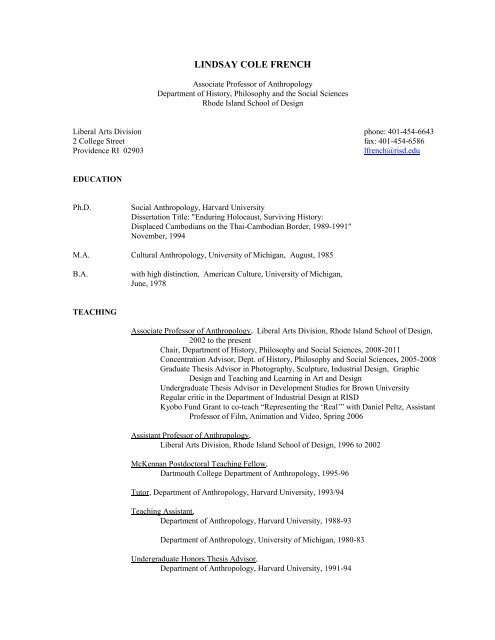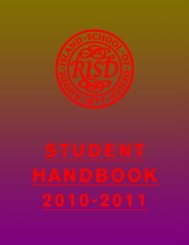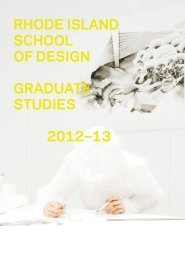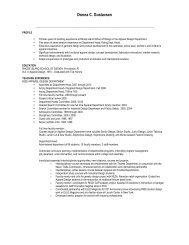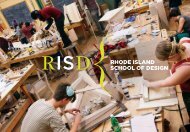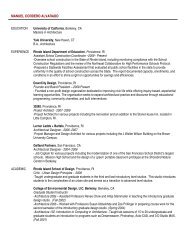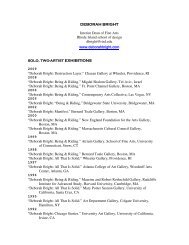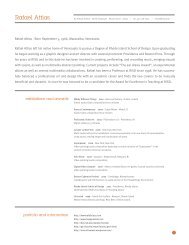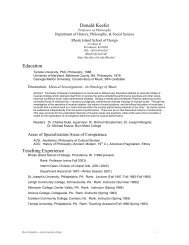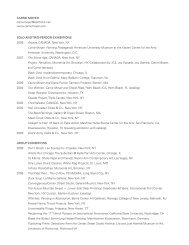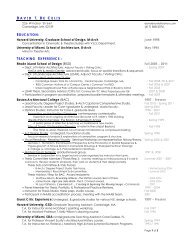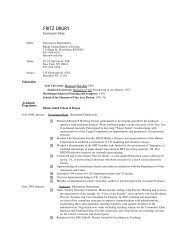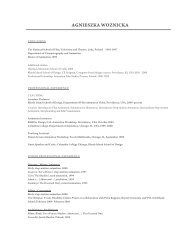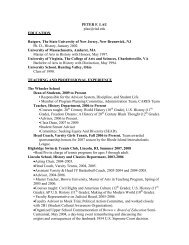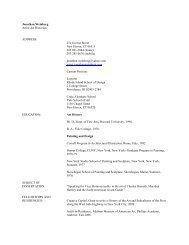Lindsay French's CV - Rhode Island School of Design
Lindsay French's CV - Rhode Island School of Design
Lindsay French's CV - Rhode Island School of Design
You also want an ePaper? Increase the reach of your titles
YUMPU automatically turns print PDFs into web optimized ePapers that Google loves.
LINDSAY COLE FRENCH<br />
Associate Pr<strong>of</strong>essor <strong>of</strong> Anthropology<br />
Department <strong>of</strong> History, Philosophy and the Social Sciences<br />
<strong>Rhode</strong> <strong>Island</strong> <strong>School</strong> <strong>of</strong> <strong>Design</strong><br />
Liberal Arts Division phone: 401-454-6643<br />
2 College Street fax: 401-454-6586<br />
Providence RI 02903<br />
lfrench@risd.edu<br />
EDUCATION<br />
Ph.D.<br />
Social Anthropology, Harvard University<br />
Dissertation Title: "Enduring Holocaust, Surviving History:<br />
Displaced Cambodians on the Thai-Cambodian Border, 1989-1991"<br />
November, 1994<br />
M.A. Cultural Anthropology, University <strong>of</strong> Michigan, August, 1985<br />
B.A.<br />
with high distinction, American Culture, University <strong>of</strong> Michigan,<br />
June, 1978<br />
TEACHING<br />
Associate Pr<strong>of</strong>essor <strong>of</strong> Anthropology, Liberal Arts Division, <strong>Rhode</strong> <strong>Island</strong> <strong>School</strong> <strong>of</strong> <strong>Design</strong>,<br />
2002 to the present<br />
Chair, Department <strong>of</strong> History, Philosophy and Social Sciences, 2008-2011<br />
Concentration Advisor, Dept. <strong>of</strong> History, Philosophy and Social Sciences, 2005-2008<br />
Graduate Thesis Advisor in Photography, Sculpture, Industrial <strong>Design</strong>, Graphic<br />
<strong>Design</strong> and Teaching and Learning in Art and <strong>Design</strong><br />
Undergraduate Thesis Advisor in Development Studies for Brown University<br />
Regular critic in the Department <strong>of</strong> Industrial <strong>Design</strong> at RISD<br />
Kyobo Fund Grant to co-teach “Representing the ‘Real’” with Daniel Peltz, Assistant<br />
Pr<strong>of</strong>essor <strong>of</strong> Film, Animation and Video, Spring 2006<br />
Assistant Pr<strong>of</strong>essor <strong>of</strong> Anthropology,<br />
Liberal Arts Division, <strong>Rhode</strong> <strong>Island</strong> <strong>School</strong> <strong>of</strong> <strong>Design</strong>, 1996 to 2002<br />
McKennan Postdoctoral Teaching Fellow,<br />
Dartmouth College Department <strong>of</strong> Anthropology, 1995-96<br />
Tutor, Department <strong>of</strong> Anthropology, Harvard University, 1993/94<br />
Teaching Assistant,<br />
Department <strong>of</strong> Anthropology, Harvard University, 1988-93<br />
Department <strong>of</strong> Anthropology, University <strong>of</strong> Michigan, 1980-83<br />
Undergraduate Honors Thesis Advisor,<br />
Department <strong>of</strong> Anthropology, Harvard University, 1991-94
Undergraduate Advisor, Department <strong>of</strong> Anthropology, Harvard University, 1992-94<br />
Writing Tutor,<br />
Derek Bok Center for Teaching and Learning, Harvard University, 1987-89<br />
The Writing Center, University <strong>of</strong> Michigan, College <strong>of</strong> Literature, Science & Arts,<br />
1980-83<br />
PUBLICATIONS<br />
Commentary on “Cultures <strong>of</strong> Trauma”, a special section IN: Culture, Medicine and Psychiatry,<br />
(28:2) June 2004 (pp. 211-220).<br />
“Exhibiting Terror” IN: Truth Claims: Representation and Human Rights. Mark Bradley and<br />
Patrice Petro, eds. Rutgers University Press, June 2002 (pp.131-155).<br />
“From Politics to Economics at the Thai-Cambodian Border: Plus Ça Change ....” IN:<br />
International Journal <strong>of</strong> Politics, Culture and Society, (15:2), Spring 2002 (pp. 427-470).<br />
“Hierarchies <strong>of</strong> Value at Angkor Wat” IN: Ethnos (64:2) June 1999, (pp. 170-191), a special<br />
issue focused on the circulation <strong>of</strong> objects and meanings entitled “Objects On The Loose”.<br />
"The Political Economy <strong>of</strong> Injury and Compassion: Amputees on the Thai-Cambodia Border"<br />
IN: Embodiment and Experience: The Existential Ground <strong>of</strong> Culture and Self, Thomas J.<br />
Csordas, editor, Cambridge University Press, 1994 (pp. 69-99).<br />
Displaced Lives: Stories <strong>of</strong> Life and Culture from the Khmer in Site II, Thailand. 1990:<br />
International Rescue Committee, Bangkok, Thailand.<br />
RESEARCH: FELLOWSHIPS AND GRANTS<br />
Sabbatical Research, Cambodia, spring 2012. Two projects:<br />
With Peter O’Neill, I began work on a video project documenting the work <strong>of</strong> Krom Akphiwat<br />
Phum, a progressive and innovative Cambodia community development NGO operating in rural<br />
Battambang province since 1993. Shooting took place in Battambang in February, March and<br />
April 2012. Translation and editing for this project are ongoing. Funding for post-production<br />
costs has been provided by RISD’s Pr<strong>of</strong>essional Development Grant.<br />
My research on evolving structures <strong>of</strong> power and authority in Battambang Province focused this<br />
spring on the rapid growth <strong>of</strong> Korean evangelical churches, in Cambodia in general and in<br />
Battambang in particular. Research began at RISD with Korean students who had been on<br />
Christian missions to Cambodia, and continued with visits to evangelical churches, <strong>of</strong>fices, and<br />
a Bible College in Battambang, and conversations with pastors, lay preachers, and congregants.<br />
Although Cambodia has been a Theravada Buddhist society since the 7 th century, Protestant<br />
Christianity came to Cambodia in the 1920s and evangelicals <strong>of</strong> many nationalities are active in<br />
Cambodia at present. I am looking at the links between Korean evangelism, the growth <strong>of</strong><br />
Korean business in Cambodia, and organized Cambodian labor migration to Korea to<br />
understand the powerful draw <strong>of</strong> Korean Christianity in particular. This project has received<br />
support from the Liberal Arts Humanities Fund.
Sabbatical Research, Cambodia, 2004 and ongoing. I am engaged in an ongoing investigation<br />
<strong>of</strong> changing patterns <strong>of</strong> hierarchy, power, and authority in northwestern Cambodia, close to the<br />
Thai border. The field research for this project focuses on families that have been divided by the<br />
Khmer Rouge, civil war, and its aftermath in Battambang Province. It has been conducted<br />
through the collection <strong>of</strong> oral histories during five months <strong>of</strong> my sabbatical in 2004, with followup<br />
interviews over two months 2012. The project builds upon my doctoral research with<br />
refugees from this area, and the work I have done on border trade and interactions between<br />
Cambodians and Thais on both sides <strong>of</strong> the border in the years since then. It has been supported<br />
by grants from the RISD Pr<strong>of</strong>essional Development Fund and the Liberal Arts Division’s<br />
Humanities Fund. Research and writing on this material is ongoing.<br />
Research Advisor, Providence, Thailand and Laos, 2003 to the present. Advisor for a film<br />
project revisiting Hmong families from Providence who were the subject <strong>of</strong> a 1982 documentary<br />
film entitled “The Best Place to Live.” The new film project, produced by FAV Pr<strong>of</strong>essor Peter<br />
O’Neill and called “Better Places” follows several Providence families to the Midwest,<br />
California, Thailand, and Laos to uncover the ways life has developed and changed for Hmong<br />
in America over the last twenty-five years.<br />
Post-doctoral Research, Thai-Cambodian Border, 1996-1997. Six months <strong>of</strong> combined library<br />
and field research on the history <strong>of</strong> Thai-Cambodian border relations, and the significance <strong>of</strong><br />
extra-legal cross-border trade. This study was part <strong>of</strong> a large, multi-national research project<br />
sponsored by the International Center for Ethnic Studies in Colombo, Sri Lanka entitled<br />
"Multiculturalism and Ethnic Coexistence in Asia." Research was funded through a grant from<br />
the Sasakawa Peace Foundation; writing was funded through a Richard Carley Hunt postdoctoral<br />
fellowship from the Wenner-Gren Foundation.<br />
Post-doctoral Resident Writing Fellowship, Program for Cultural Studies, East-West Center,<br />
Honolulu, HI, 1994-5. This fellowship provided a year <strong>of</strong> support for revisions on my doctoral<br />
dissertation, toward eventual publication<br />
Doctoral Research, Thai-Cambodian Border, 1989-1994. Twenty months <strong>of</strong> ethnographic<br />
research with Cambodians displaced to the Thai border, on social relations in the aftermath <strong>of</strong><br />
great social and cultural trauma. Fieldwork was carried out in 1989, 1990, and 1991 in Site II, a<br />
camp <strong>of</strong> 180,000. Research was supported by the International Rescue Committee, a nongovernmental<br />
refugee relief agency. Writing was funded in part with a Charlotte W. Newcombe<br />
Doctoral Dissertation Fellowship from the Woodrow Wilson Foundation. The dissertation along<br />
with additional research conducted in Cambodia in autumn 1994 and summer 1996 provides the<br />
basis for an expanded book manuscript under consideration at the University <strong>of</strong> Hawai’i Press,<br />
entitled “The Border Khmer: Between History and Memory”.<br />
Doctoral Study, 1986-94, additional funding for doctoral work included two pre-doctoral<br />
fellowships from the National Institutes <strong>of</strong> Mental Health, two Foreign Language Areas Studies<br />
Summer Fellowships, and two Teschemacher Travel Grants from Harvard University.<br />
Oral Historian, 1983-1987. The Oral History Center, Cambridge, MA.<br />
Worked on all aspects <strong>of</strong> several community oral history projects which collected and presented<br />
the life stories <strong>of</strong> members <strong>of</strong> Cambridge's diverse cultural communities. Served on the Board <strong>of</strong><br />
Directors <strong>of</strong> the Oral History Center for four years.<br />
RECENT CONFERENCE PAPERS, PANELS, AND INVITED TALKS<br />
Discussant for the panel “Re-Imagining Cambodia” at the Cambodian Studies Conference at<br />
Northern Illinois University, September 2012.
Discussant for the panel “New Forms <strong>of</strong> Social Organization in Rural Cambodia” at the Annual<br />
Meeting <strong>of</strong> the Association <strong>of</strong> Asian Studies, Honolulu, Hawai’i, April 2011.<br />
“’Dark Dream’: Looking at Photographs <strong>of</strong> Cambodia”. Invited talk at the Bannister Gallery,<br />
<strong>Rhode</strong> <strong>Island</strong> College, on an exhibition <strong>of</strong> photographic installations by Eva Sutton, Associate<br />
Pr<strong>of</strong>essor <strong>of</strong> Photography at RISD, on the subject <strong>of</strong> contemporary Cambodian experience.<br />
October 2008.<br />
“Cambodia’s Ongoing Crisis”. Presented at a two-day workshop at Harvard University entitled<br />
“Inadvertent Documents New (and Old) Form <strong>of</strong> Political and Historical Mediation”. This<br />
workshop is part <strong>of</strong> a multi-year collaborative project called “Signs <strong>of</strong> Crisis in Southern Asia”<br />
which investigates communicative technologies and contemporary politics in the South and<br />
Southeast Asian post-colonies. April 2005.<br />
“Poverty, Political Instability and Fine Art Patronage: The Political Economy <strong>of</strong> Temple Looting<br />
in Cambodia.” Presented at a RISD Museum Symposium entitled Relics, Ruins, and Rights:<br />
Who Owns Cultural Treasures ? October 23, 2004.<br />
“Dialogues with ‘Cultures <strong>of</strong> Trauma.’” Presented at the Medical Anthropology and Cultural<br />
Psychiatry research seminar at Harvard, entitled “Memory, Suffering and Global Security”<br />
October 2003.<br />
“Our History Too.” Essay solicited for the program <strong>of</strong> “Silence <strong>of</strong> God”, a new play about<br />
recent Cambodian history, by Catherine Filloux. This play was commissioned by the New<br />
American Theatre Festival in Shepherdstown, WVA, and was one <strong>of</strong> four plays that made up<br />
the summer 2002 season.<br />
“‘Outsider Art” in the Aftermath <strong>of</strong> Violence.” Presented at a workshop on Art, Media and<br />
Violence in Southeast Asia, Harvard University, May 10-11, 2002.<br />
“(Re)-presenting Cambodia in America: Some Notes on Art, Ignorance and Opportunity.”<br />
Presented at “Fact and Fiction in Post-Authoritarian Societies,” a symposium organized by the<br />
Legacies <strong>of</strong> Authoritarianism Project, Global Studies Program, University <strong>of</strong> Wisconsin-<br />
Madison, May 2001.<br />
“Tuol Sleng at the MoMA and Other Unlikely Venues: the Ethics <strong>of</strong> Exhibition in a Digital,<br />
Transnational World.” Presented at the 8th annual conference <strong>of</strong> the Joint Center for<br />
International Studies at the University <strong>of</strong> Wisconsin-Milwaukee and the University <strong>of</strong><br />
Wisconsin-Madison, entitled “Between the Global and the Local: Making Human Rights Claims<br />
in the 20th Century” in April, 2000.<br />
“Secular Power and Buddha Power in Cambodia Today.” Presented at the Harvard Buddhist<br />
Studies Forum’s 1999-2000 lecture series, Harvard University, December 1999.<br />
“Exhibiting Terror.” Guest scholar at the University <strong>of</strong> Oregon Center for Asian<br />
and Pacific Studies; paper presented at “Violence, Suffering, Image,” a conference sponsored by<br />
the Savage Endowment for International Relations and Peace Studies, May 1999.<br />
“Hierarchies <strong>of</strong> Value at Angkor Wat.” Paper presented as part <strong>of</strong> a panel I co-organized for the<br />
96th Annual Meeting <strong>of</strong> the American Anthropological Association, Washington DC,<br />
November 1997, entitled “Objects At Loose.”<br />
"Border-Crossing: Thailand/Cambodia 1996." Paper presented as part <strong>of</strong> a panel I co-organized<br />
for the 95th Annual Meeting <strong>of</strong> the American Anthropological Association, San Francisco,<br />
November 1996, entitled "Border Incidents."
"Battlefields Into Marketplaces: Politics and Trade at the Thai-Cambodian Border." Presented<br />
to the Southeast Asia Program's Brown Bag Seminar, Cornell University, October 1996.<br />
"New Ethnography in Cambodia, Parts I and II." A double panel, which I organized and<br />
chaired, at the 48th Annual Meeting <strong>of</strong> the Association <strong>of</strong> Asian Studies, Honolulu, April 1996.<br />
SELECTED PROFESSIONAL SERVICE<br />
Conducted an external evaluation <strong>of</strong> the Junior Faculty Training Program, a program <strong>of</strong> the<br />
Center for Khmer Studies in Phnom Penh, Cambodia, funded by the Rockefeller Foundation,<br />
August-September 2010. This program sought to strengthen the institutional capacity <strong>of</strong><br />
Cambodian universities and the academic capacity <strong>of</strong> young Cambodian scholars by providing<br />
graduate level seminars in Southeast Asian Studies taught by international scholars over a sixyear<br />
period. The evaluation was conducted at the end <strong>of</strong> the second funding cycle for the<br />
program, in anticipation <strong>of</strong> new funding proposals.<br />
Introduced and provided running commentary for a performance <strong>of</strong> classical Cambodian dance,<br />
produced by Firstworks and performed at RISD by the Angkor Dance Troupe, June 2009.<br />
Presented three lectures on the history <strong>of</strong> recent and ongoing crises in Cambodia, as part <strong>of</strong> an<br />
enrichment curriculum on Current Issues in Southeast Asia for K-12 educators, at Primary<br />
Source, a private, non-pr<strong>of</strong>it educators resource center in Watertown, MA. May-July 2007.<br />
In conjunction with “The Spirit <strong>of</strong> Cambodia….A Tribute”, a two month-long series <strong>of</strong> events<br />
around Providence honoring Cambodian art and artists in Fall 2002, I helped to arrange and cohosted<br />
the screening <strong>of</strong> five films by Rithy Panh, award-winning French-Cambodian filmmaker,<br />
at the RISD Auditorium. Panh himself came from Paris to attend the screenings and speak about<br />
his films. It was an unusual gathering <strong>of</strong> students, academics, Cambodian-Americans, and people<br />
who have worked with Cambodians in a variety <strong>of</strong> contexts over the previous 23 years. The<br />
films were well attended and extremely well received by all constituencies. It was a remarkable<br />
community event, and provided the foundation for future collaborations between RISD and the<br />
event’s co-sponsor, the Cambodian Society <strong>of</strong> <strong>Rhode</strong> <strong>Island</strong>.<br />
In response to a number <strong>of</strong> critical issues that arose in the aftermath <strong>of</strong> the 9/11 attacks in<br />
Washington and New York, I organized a public speaker series for Wintersession 2002 entitled<br />
“Current World Crises: Contexts and Frameworks.” On five successive Thursday nights,<br />
scholars and practitioners came to RISD to discuss the role <strong>of</strong> the news media in unfolding world<br />
crises, civil liberties in times <strong>of</strong> war, artists’ responses to great political and social upheavals,<br />
Islam and radical Islam, and the Pashtun culture <strong>of</strong> Afghanistan.<br />
Served from 1999 to 2001 as advisor and oral historian for “Signs <strong>of</strong> the Market,” an exhibition<br />
<strong>of</strong> handpainted Cambodian shop signs, curated by Laurie Beth Kalb, Ph.D., and exhibited at the<br />
Mills Gallery, Boston Center for the Arts, March & April 2001. My participation was supported<br />
by a grant from the Massachusetts Foundation for the Humanities, which requires humanities<br />
scholars’ participation in all the projects it funds.<br />
Presented two seminars on the history <strong>of</strong> Cambodian refugees in America at Middlesex<br />
Community College, Lowell, MA as part <strong>of</strong> an NEH- funded initiative to bring in scholars to<br />
educate MCC faculty about the backgrounds <strong>of</strong> their refugee and immigrant students, Oct. 1999.<br />
Presented a talk to the Cambridge Hospital Child and Adolescent Psychiatry Unit on conditions<br />
in Cambodia under Pol Pot and in refugee camps, experienced by people who were eventually
esettled to the United States. The purpose was to provide historical background to the distress<br />
that Cambodian patients presented on their unit. 1997.


